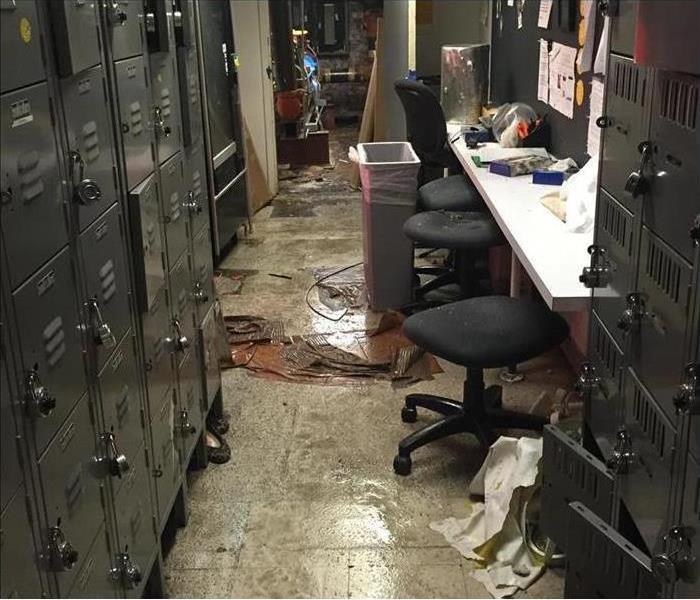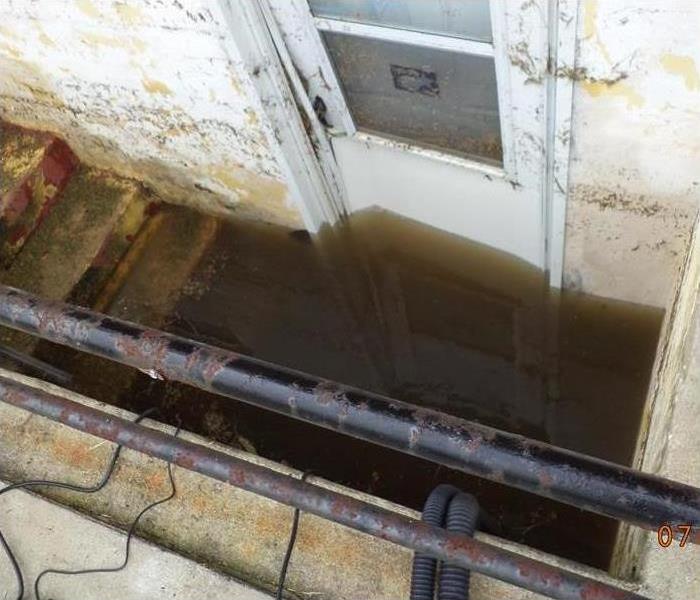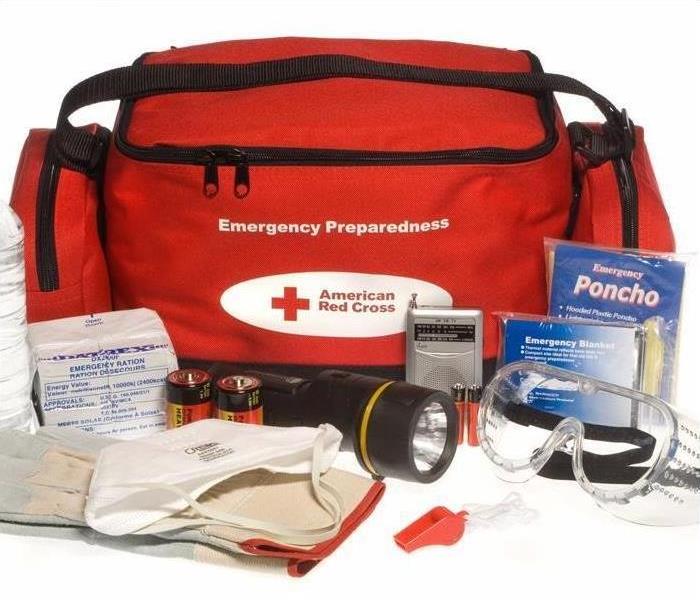Recent General Posts
Protecting Your Property
2/9/2023 (Permalink)
Winter Safety Tips
With the colder weather upon us, it is important to be prepared to avoid damage to your home and/or business. Cold weather can wreak havoc and cause costly damages. Whether it is heavy rain, sleet or snow, freezing temperatures, or damaging winds, all can cause major property destruction. Although the weather is up to Mother Nature alone, you can take the steps to be prepared and risk bigger damage with the winter weather.
To help prevent damages related to the weather, there are a few safety precautions one can take such as:
- Check your home or business property for downed tree limbs and branches. Winter weather conditions can cause branches to fall, which can cause damage to the property and even potentially cause personal injuries.
- Roofs, water pipes, and gutters should all be regularly inspected to make certain that they are in proper condition. The gutter downspouts should be directed away from your building. Be sure to have your gutters cleared of debris. Have leaves regularly raked and blown?
- Make sure any chimney and exhaust system are free of debris.
- Test gas lines if they have been out of use to make sure they are in good working condition with no leaks.
- Examine your property. Check walkways and parking lots for proper drainage or pooling after rainstorms.
- Take precautions to avoid pipes from freezing. Keep garage doors closed if there are water supply lines in the garage. When temperatures start to take a drop, let the cold water drip from the faucet. Never set your heat below 60 degrees Fahrenheit. Ensure all exterior pipes are properly insulated.
- Ask your local SERVPRO Franchise about completing an Emergency Ready Profile (ERP) for your business. This no-cost assessment provides you with a plan to get your business back up and running faster after an emergency disaster.
Although we are not in control of the winter weather nor can we predict the future, it is always better to be prepared! Being prepared for a disaster will ensure that you are back up on your feet in a shorter period of time than if you did not have a plan. If you run a commercial business, get an Emergency Ready Profile set up as soon as possible and avoid the headache of not knowing what to do after a disaster strikes. Disaster stops for no one, so get ahead of it and have a plan set!
Building Cleanup
11/29/2017 (Permalink)
 Condition of the building before our team went in.
Condition of the building before our team went in.
At SERVPRO of Orange, Sullivan & So. Ulster Counties we understand the frustration that comes with damage to your home or property. This is why we work hard to ensure our customer’s satisfaction above all else. When looking at the picture you can see that this property faced a number of different issues that caused them to call us. The floor suffered water damage that led to a number of other issues. Our crew went in and used their SERVPRO tools to help get rid of the water and other damage the property suffered. We used air movers, air scrubbers, and dehumidifiers to remove all of the water on the property. Then we went back in and cleaned what we needed to in order to restore the property back to the desired state.
Fix Up Your Firebox
5/15/2017 (Permalink)
 Unsightly cracked and crumbling mortar inside a fireplace can be fixed in minutes with a few simple tools.
Unsightly cracked and crumbling mortar inside a fireplace can be fixed in minutes with a few simple tools.
The mortar in most brick joints consists of sand, lime, and Portland cement. But in a fireplace, that mix just crumbles away when subjected to roaring wood fires. For this application, masons rely on a refractory mortar made of magnesium silicate, which can withstand beat up to 2,000 degrees F. Yet even refractory mortar can fail as the brickwork expands and contracts with repeated fires. Fortunately, fixing those damaged joints is a snap, thanks to high-temp fireplace mortars packaged in caulk tubes.
Tools Needed:
- Nitrile gloves
- 5-gallon bucket
- Sponge with abrasive pad
- Grout-removal tool with triangular carbide blade
- Stiff-bristle brush
- Wet/dry vac
- Nylon-bristle brush
- Refractory mortar
- Caulk gun
- Tuck-point trowel
STEPS
- Wash the brick: Put on nitrile gloves, then thoroughly scrub soot off the sides of the firebox with an abrasive pad on a wet sponge. Soot dissolves fairly easily when wet. The washing also dampens the brick and mortar, a necessary step before repointing.
- Dig out the loose mortar: Using a grout-removal tool fitted with a triangular carbide blade, scrape out cracked, loose, and crumbling mortar. Stop when the sides of the blade touch the edges of the brick. The blade’s triangular shape prevents it from going too deep (more than half the width of the joint). Clean the joints with a narrow, stiff-bristle brush and sweep up the mortar crumbs with a wet/dry vac.
- Wet the joints: Go over all the scraped joints with a nylon paintbrush, dipping repeatedly into a bucket of clean water. Refractory mortar bonds best to a damp surface, and the brush bristles ensure that all of the old brick and mortar are moistened.
- Caulk the joints: After slipping a tube of refractory mortar into a caulk gun, drag the tube’s nozzle over all the scraped mortar joints, leaving behind a fat bead of caulk. Make sure to fill any gaps between the hearth and the firebox floor.
- Pack the mortar: Use a 3/8-inch-wide tuck-pointing trowel to smooth and press the soft mortar firmly into each of the joints, then scrape off the excess with the trowel’s edge. In corners, use a gloved finger to pack and smooth.
- Wipe away the residue: Multiple swipes with a damp sponge with remove most of the mortar residue. Wipe the brick again in 24 hours, after the remaining residue dries to a haze. This mortar’s heat-resistant qualities kick in when it reaches 500 degrees. Either a heat gun or a small, brief fire will serve the purpose.
Keeping your firebox in tip-top shape is just one step in keeping your fireplace in good working order, and preventing home fires.
Do you know how to shut off the water at your work?
5/4/2017 (Permalink)
 Now that's a huge water damage!
Now that's a huge water damage!
Many workplaces always call's on the boss or the maintenance man when something goes wrong. What if they were home sick, or in a meeting and you need to locate the water shut off, where do you start?
SERVPRO of Orange County can help commercial property in planning for a water, fire, storm damage. How, with a free Emergency Response Profile created by the SERVPRO Marketing Department.
By having a plan of action and including it into your regular training at your office you can minimize the cost if an unplanned event happens like a frozen pipe, fire, or anything.
Some property manager use this as a tool to keep everything organized in one central location.
Is your business ready for a disaster. Even a simple pipe burst can cause a lot of damage and headache. With a SERVPRO® Emergency READY Profile it can have the critical information to minimize damages, provide the resources for the employees of the company, and provide property details and information. This is a FREE services that we provide to commercial properties.
Make an appointment today to get started!
If the unthinkable happens, call your local SERVPRO of Orange County Professionals at (845)-342-3333 seven days a week 24/7 to help you avoid the cost and hassle of secondary damages. We will help make it "Like it never even happened."
Are You Prepared for a Power Outage
3/24/2017 (Permalink)
 Ready Kit
Ready Kit
You may need to survive on your own after an emergency. This means having your own food, water and other supplies in sufficient quantity to last for at least 72 hours. Local officials and relief workers will be on the scene after a disaster but they cannot reach everyone immediately. You could get help in hours or it might take days. Depending on the nature of the disaster road conditions may prevent help from arriving in a timely manner.
Additionally, basic services such as electricity, gas, water, sewage treatment and telephones may be cut off for days or even a week, or longer. Your supplies kit should contain items to help you manage during these outages. If the power goes out keep your pipes from freezing by shutting off the valve that allows water to come into your home. Then, open any drain valves and all faucets and let them run until the pipes are empty (it's helpful to identify these valves in advance). Next, flush all toilets and pour denatured alcohol into toilets and sinks to prevent water in the traps from freezing. Do NOT use automotive antifreeze in case there's trouble with your water system; you don't want the antifreeze to contaminate your drinking water. You may, however, use nontoxic antifreeze that's made for winterizing motor homes.
Be prepared for a power outage by keeping necessary items centrally located in your home. Take the time to ensure that everyone in your family is aware of the "kit." Periodically check your kit to see that batteries operate properly. The following is a list of items that are suggested to keep on hand:
- Flashlights for each family member
- Battery-operated radio and clock
- Extra batteries
- Containers of bottled water
- Canned, freeze-dried or dehydrated food, powdered milk, baby supplies for infants
- Non-electric can opener
- List of important phone numbers
- First-aid kit
Following a disaster, there may be power outages that could last for several days. Stock canned foods, dry mixes and other staples that do not require refrigeration, cooking, water or special preparation. Be sure to include a manual can opener and eating utensils. The following items are suggested when selecting emergency food supplies. You may already have many of these on hand.
- Store at least a three-day supply of non-perishable food.
- Choose foods your family will eat.
- Remember any special dietary needs.
- Avoid foods that will make you thirsty.
- Choose salt-free crackers, whole grain cereals and canned foods with high liquid content.
- Ready-to-eat canned meats, fruits, vegetables and a can opener
- Protein or fruit bars
- Dry cereal or granola
- Peanut butter
- Dried fruit
- Nuts
- Crackers
- Canned juices
- Non-perishable pasteurized milk
- High energy foods
- Vitamins
- Food for infants
- Comfort/stress foods
These and many other helpful tips are available at ready.gov Here is the link to inter tips for before during and after a winter storm http://www.ready.gov/winter-weather
Call SERVPRO of Orange County 24/7 t (845)-342-3333.
Safety Tips for Winter Activities
3/13/2017 (Permalink)
 Winter recreational activities may help fight off cabin fever, but they also can be dangerous.
Winter recreational activities may help fight off cabin fever, but they also can be dangerous.
Before heading outside, brush up on these safety tips for the slopes, rink, and more.
Dressing the Part
Staying warm is important for all winter activities. Protect yourself from hypothermia by wearing polypropylene undergarments — which absorb sweat but also retain heat — and layers of water- and wind-resistant clothing. And don't forget the essentials: hats, gloves or mittens, wool socks, and waterproof boots.
Hitting the Slopes
These safety tips can help reduce your chances of injury when you're downhill skiing or snowboarding:
- Take lessons on how to stop, slow down and turn.
- Never ski or snowboard alone.
- Always wear a certified helmet with wraparound goggles.
- Secure loose straps or clothing.
- Identify the appropriate trails for your skill level.
- Check your equipment before and after each run.
Skating Outdoors
Keep these safety guidelines in mind when ice-skating or playing hockey outside:
- Stick to ice at least 6 inches thick and free of ice fishingholes and other debris.
- Avoid ice that has formed over running water, such as a river.
- Always wear a helmet: Hockey helmets offer the best protection.
- Wear proper hockey equipment, including pads and gloves.
- Learn how to properly fall on ice.
Snowmobile Cruising
Inexperience and poor judgment are both leading causes of snowmobile crashes. Learn how to ride safely:
- If you are a novice, consider taking a snowmobile or snow machine safety training course before your first outing.
- Wear a helmet that meets the current Department of Transportation certification standards.
- Wear appropriate cold weather gear, such as a snowmobile suit, snow bib, jackets, and gloves, to cut the wind, repel water and allow ventilation.
- Always go snowmobiling in groups and notify someone at home where the group is headed and the expected return time.
- Always check the weather conditions before departing.
- If traveling in mountainous terrain, check for "Avalanche Conditions."
- Know the area where you're riding, if possible. There may be hazards, such as washouts (melted snow, flowing water or erosion impacting the trail, road or field), fences and drop-offs in unfamiliar areas.
- Before departing, check your machine's fuel and fluid levels to make sure they are sufficient for the trip. You should also check the machine's overall condition and operation.
- Never drive too fast for your comfort level, and keep speeds below 40 miles per hour at night.
- Stay on designated trails.
- Avoid driving on ice, but if it's the only option, wear a lifejacket.
- Always ride sober, which includes avoiding prescription medications that may affect how you ride.
- Be cautious when crossing roadways.
- Never approach wildlife.
- Carry a first-aid kit, water and non-perishable food in case of a mishap on the trail.
Source: https://learningcenter.statefarm.com/safety-2/family-1/safety-tips-for-winter-activities/index.html?cmpid=enews-dec15#sthash.e6T1EjVt.dpuf
Sometimes, we feel like superheroes!
2/21/2017 (Permalink)
 SERVPRO of Orange County responds to hundreds of jobs each year.
SERVPRO of Orange County responds to hundreds of jobs each year.
Whether it be a burst pipe, a kitchen fire or mold found in the basement, most of our customers are dealing with a stressful situation and trust us to be the experts who can help them out. For our customers, having their home and belongings destroyed is a traumatic experience. The opportunity to come into a home in need with the knowledge, equipment and skilled workers required to repair the damage is greatly rewarding to us.
We received the following testimonial from Linda C. on "Angie's List" that exemplifies why we love the work we do. Thank you, Linda. You made us feel like superheroes!
"We never realized before how important it is to clean air ducts. This fall, a family member with asthma experienced difficulties whenever the hot air furnace turned on. We kept the furnace off and contacted several NADCA (National Air Duct Cleaning Association) contractors and left messages; however no one returned our calls. After several days of waiting in the cold, a local (unnamed) service provider recommended SERVPRO. We were grateful to the local company for recommending a competitor, SERVPRO. SERVPRO's response was fast and professional. We are completely satisfied with their work
Professional workers from SERVPRO responded after urgent call from homeowner. Arrived the very next morning and worked for several long hours in a cold house until the work was finished. We are completely satisfied with their work. Problem resolved. No more dust or contaminants in the air ducts, and family member with asthma experienced no further breathing difficulties after work was completed. We were able to use our furnace once again. There is a noticeable difference in the air quality throughout the house. Three individuals who provided service were excellent workers, left each room in perfect condition and communicated with us the steps involved, and gave us reports on the work progress and what to expect from the results. Excellent service professionals. We highly recommend this company."
Be SERVPRO Ready Before You Go on Vacation
6/16/2016 (Permalink)
 You can relax on vacation knowing SERVPRO of Orange, Sullivan and S.Ulster counties has you covered.
You can relax on vacation knowing SERVPRO of Orange, Sullivan and S.Ulster counties has you covered.
Picture this: You are lounging on a wooden beach chair with sunglasses, staring at the beautiful ocean on your vacation. This is the first time in months you have felt relaxed. Suddenly, your cell phone rings. On the phone is your neighbor who called to let you know there was a small kitchen fire in your home.
Going on vacation should be relaxing and worry-free. It is important to make sure your house is secure before you leave for your trip. Be SERVPRO ready so you do not have to come back to damages in your home.
Below are some tips for preparing your home provided by SERVPRO of Orange, Sullivan and South Ulster Counties.
Make Arrangements with an Emergency Contact and Prevent Burglaries
Choose a close friend or a neighbor you trust as your emergency contact and provide them with all of your travel and hotel information in case they need to contact you.
A timer on lights will give the impression someone is in the house.
Leave written directions for alarm codes, doors or other information needed to properly care for your home.
Burglars often look for homes with mailboxes overflowing, make sure your mail is collected.
The Post Office can suspend your mail and start delivering again the day you get back.
Prevent Water, Fire or Electrical Damage
Shut off gas and water at the meter, supply tank or appliances.
Turn off the water valves to washing machines, sinks and the dishwater.
Do not forget to unplug electronics to cut down on any possible shortages which could potentially cause a fire. According to Reader’s Digest, electrical equipment is the fourth common cause of house fires.
Check your smoke and carbon monoxide detectors to ensure they are working properly.
Adjust your thermostat for the season. In the winter, it should be between 55-60 degrees and in the summer between 75-80 degrees.
A Few Last Things Before You Leave….
If you use a security system, notify your security system that you are leaving town. In addition, tell the neighbors you trust to keep an eye out on the house for anything suspicious.
Take out all of your trash to prevent your house from getting too smelly.
The day you leave, go on one last walk through your home to secure windows, blinds, fences, doors and plugs. In case of emergency, this will make it easier for safety personnel to navigate through your home.
If your neighbor calls while you are on vacation or you come back and encounter damages in your home, you can rest assured SERVPRO of Orange, Sullivan, and South Ulster Counties will make it like it never even happened. We provide 24-hour emergency service and are dedicated to responding faster to any size disaster. If you have any questions you can visit us at www.SERVPROosu.com or call us at 845-791-7647. Our trained professionals are standing by.






 24/7 Emergency Service
24/7 Emergency Service





